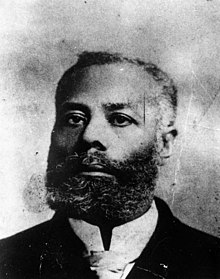Elijah McCoy
| Elijah McCoy | |
|---|---|
 |
|
| Born |
Elijah J. McCoy May 2, 1844 Colchester, Ontario, Canada |
| Died |
October 10, 1929 (aged 85) Detroit, Michigan, United States |
| Resting place | Detroit Memorial Park East in Warren, Michigan, U.S. |
| Nationality | Canadian |
| Education | Mechanical Engineering |
| Occupation | Engineer, inventor, initially employed as a railroad fireman and oiler |
| Employer | Mine Coaling |
| Known for | Inventions, particularly his Mechanical Lubricator |
| Spouse(s) | Ann Elizabeth Stewart; Mary Eleanor Delaney |
| Parent(s) | Mildred Goins and George McCoy |
Elijah J. McCoy (May 2, 1844 – October 10, 1929) was a Canadian-American inventor and engineer who was notable for his 57 U.S. patents, most having to do with the lubrication of steam engines. Born free in Canada, he returned as a five-year-old with his family to the United States in 1847, where he lived for the rest of his life and became a U.S. citizen.
Elijah J. McCoy was born free in 1844 in Colchester, Ontario, Canada to George and Mildred (Goins) McCoy. They were fugitive slaves who had escaped from Kentucky to Canada via helpers through the Underground Railroad. In 1847, the family returned to the US, settling in Ypsilanti, Michigan. He had eleven siblings.
At age 15, McCoy traveled to Edinburgh, Scotland for an apprenticeship and study. After some years, he was certified in Scotland as a mechanical engineer. After his return, he rejoined his family.
In Michigan, McCoy could find work only as a fireman and oiler at the Michigan Central Railroad. In a home-based machine shop in Ypsilanti, Michigan McCoy also did more highly skilled work, such as developing improvements and inventions. He invented an automatic lubricator for oiling the steam engines of locomotives and ships, patenting it in 1872 as "Improvement in Lubricators for Steam-Engines" (U.S. Patent 129,843).
Similar automatic oilers had been patented previously; one is the displacement lubricator, which had already attained widespread use and whose technological descendants continued to be widely used into the 20th century. Lubricators were a boon for railroads, as they enabled trains to run faster and more profitably with less need to stop for lubrication and maintenance.
...
Wikipedia
